
Druzy Quartz Gem: Meaning, Healing Properties, Uses & Value
 Druzy quartz is a unique gemstone beloved for its natural, glittering collection of tiny crystals and variety of colors. These gems are a unique formation for quartz, but other minerals can form as druzy as well.
Druzy quartz is a unique gemstone beloved for its natural, glittering collection of tiny crystals and variety of colors. These gems are a unique formation for quartz, but other minerals can form as druzy as well.
First, what is a druzy crystal? Druzy is a compact layer of tiny crystals that form inside or on the surface of a larger rock or crystal. The terms druse, druze, drusy, and drusies all fall under the same druzy definition. Also, some may reverse the order to “quartz druzy.”
The small crystals in druzy quartz are visible, unlike the tiny crystal aggregates seen in stones like the microcrystalline quartz, chalcedony.
Want to know what makes this gem so enchanting? Come along as we go into druzy quartz properties, healing powers, prices, and more!
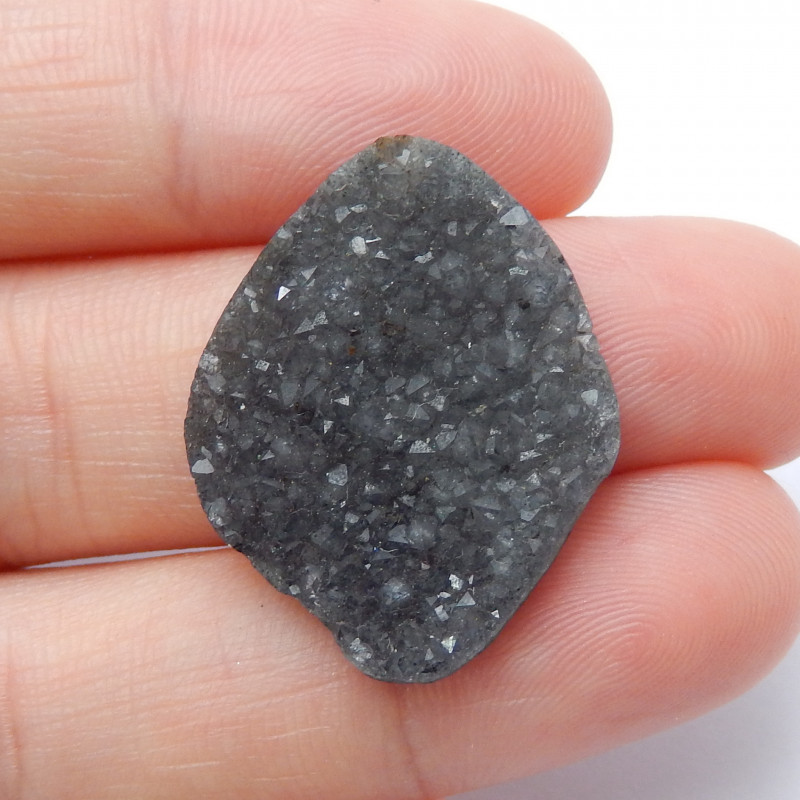
What Is Druzy Quartz?
Druzy quartz is a semi-precious gemstone usually found in earth tones but available in any color. The crystal clusters resemble snow or sugar.
These stones can function as different monthly birthstones, depending on the quartz’s color. Yellow to orange quartz (citrine) is a November birthstone, and purple quartz (amethyst) is a February birthstone!
Astrologically, blue druzy quartz is a powerful zodiac stone for Capricorn.
Druzy Specifications & Characteristics
Druzy can form from various minerals, but quartz is most common, making up over 95 percent of druzy.
How can you tell fake druzy from the real thing?
Fake druzy (often resin particles) have less-defined crystals, lower sparkle, and gray, straight side edges.
The most accurate method is using a 10x-magnification loupe; if the iridescent colors evenly coat the crystals, it’s probably real. You can also carefully scrape the crystals with a knife — if any bits fall out, it might be fake.
Here’s a list of (real) druzy quartz properties:
Mohs hardness: 6-7
Color: Usually white, red, orange, yellow, or brown; Sometimes purple, green, blue, pink, or black; May be spotted; Dyes can produce any color
Crystal structure: Trigonal
Luster: Vitreous (glass-like)
Transparency: Transparent to opaque
Refractive index: 1.54-1.55
Density: 2.65-2.66
Cleavage: None to indistinct
Fracture: Conchoidal, uneven, or granular
Streak: White
Luminescence: Sometimes triboluminescent (friction-induced glow) and phosphorescent (glows for longer); X-rays - blue glow in rose quartz; Sometimes fluorescent in white, green, orange, or brown under SW-UV & LW-UV; Amethyst - blue in SW-UV, Rose quartz - purple in SW-UV
Pleochroism: Sometimes in colored quartz varieties
From the outside, druzy stones usually look like ordinary rocks. But crack it open and voilà — a trove of sparkling treasure inside!
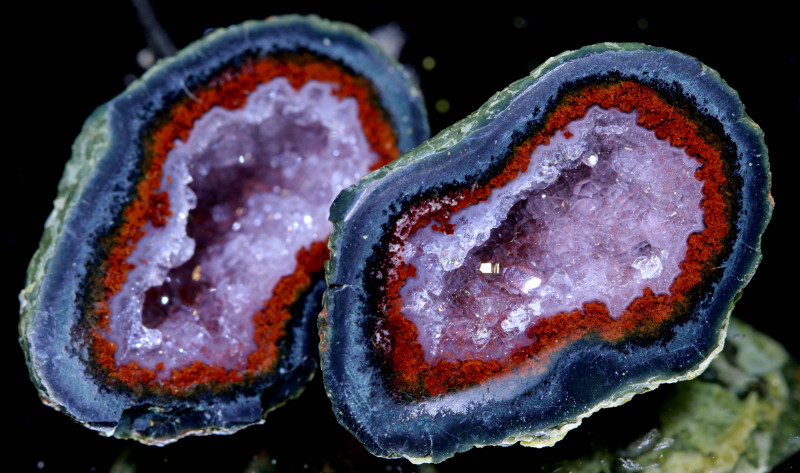 Image: Druzy inside a sliced geode (note the hollow center)
Image: Druzy inside a sliced geode (note the hollow center)
Druzy in Geodes & Thundereggs
Most quartz druzy appears inside agate geodes or thundereggs. This is where common misunderstandings come in.
Some people incorrectly call druzy a geode. A “geode” is the entire stone, including druzy, while “druzy” only refers to the layer of crystals.
Another misconception is geodes vs. thundereggs. They’re similar, but geode interiors have crystals around a hollow center while thunderegg interiors are solid groups of crystals (no hollow center). Also, some only classify thundereggs as having chalcedony interiors and rhyolite exteriors, though not all agree on this definition.
With the fundamentals down, let’s discuss different types of druzy quartz.
 Image: Window druzy cabochon
Image: Window druzy cabochon
Types of Druzy
As mentioned, you can find druzy with other crystals such as malachite, garnet, rainbow pyrite, or hematite, to name a few.
Quartz alone is extremely versatile, so it’s no surprise that there are multiple varieties of quartz druzy.
One classification method would be by the quartz variety: citrine druzy, amethyst druzy, smoky quartz druzy, and so on. However, the more common quartz druzy types you’ll see while shopping are:
Titanium Druzy: General term for any quartz druzy treated with titanium coating to create a metallic, iridescent finish
Spirit Quartz: Also called pineapple quartz or cactus quartz; Quartz crystal with crust of quartz druzy, often treated with CVD coating (discussed later!)
Peacock Druzy: Quartz druzy that’s heat-treated and titanium-coated to have blue, green, and pink colors on a gray background and iridescent shimmer
Window Druzy: Druzy only peeks out from a small area, usually in rounded gems
Flat Druzy: Druzy covers the entire surface, usually in smaller gems
Metaphysically, what is the meaning of a druzy stone?
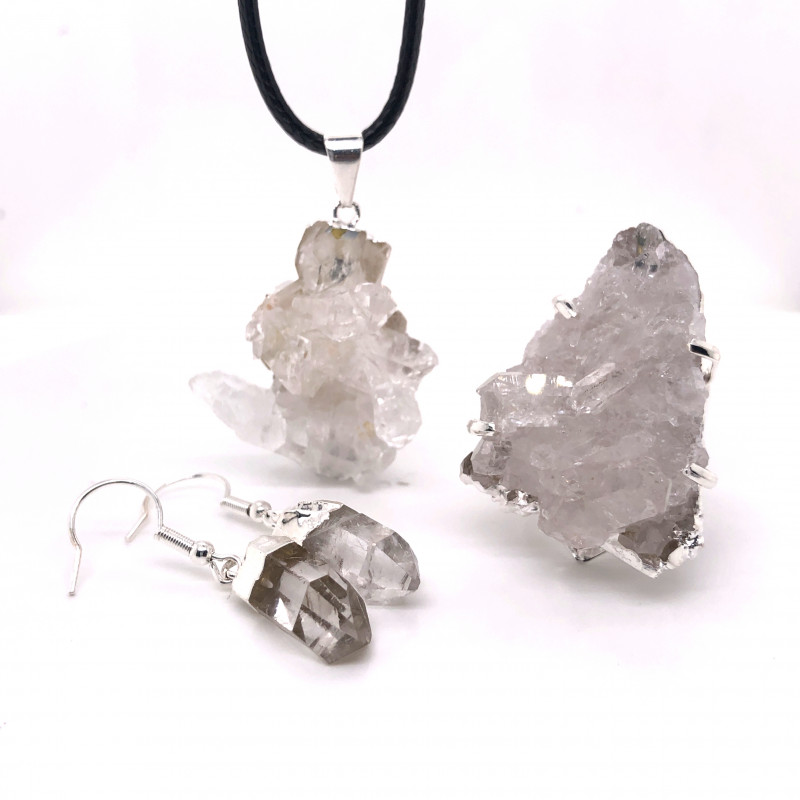
Druzy Quartz Meaning & History
Spiritual druzy nicknames include “Stone of Stardust” or “Gemstone of Heaven.” The multitude of unique crystals emerging together tie druzy’s meaning to harmony and unity.
The sparkling, reflective surface of this stone also attaches the druzy crystal meaning to mirrors. Mirrors give us an image of ourselves and the world around us, so druzy stones represent awareness, truth, and enlightenment.
The older name “druse” is a German term meaning “node,” “weathered stone,” or “crystallized ore,” depending on who you ask.
Nearly every ancient society used quartz. So quartz druzy uses should go back centuries too, right? Not exactly.
Before the 1990s, druzy was largely unknown outside of mineralogy. One possible reason for the ‘90s surge is the discovery of the iridescent pyrite druzy called “rainbow pyrite” in Russia, which first appeared in the late 1990s.
Plus, the ‘90s trends of large, flashy jewelry — remember the Heart of the Ocean necklace from Titanic? — set the stage for druzy stone jewelry to finally shine in the public light.
Part of druzy’s popularity spread to crystal healing communities. That said, what is druzy quartz good for?

Druzy Healing Properties
Like quartz and all other gems, druzy quartz is a potent healing stone. The common white quartz druzy parallels other white gemstone benefits, like bringing hope and cleansing negative energies.
Quartz is called the “Master Healer,” so it’s only fitting that druzy quartz is also a chakra stone for opening the highest energy center: the crown chakra!
Many crystal healers recommend setting intentions while meditating with quartz druzy to manifest your desires by sending your dreams out into the universe.
Read on to discover druzy quartz benefits for physical, emotional, and chakra healing!
Physical Healing
Druzy quartz crystals are believed to help the immune, circulatory, and reproductive system function better. Other common uses include speeding recovery from infections and treating damaged cartilage or bones.
Emotional Healing
Emotional druzy quartz healing properties are said to bring relaxation, creativity, and mental clarity. The stone may empower you with greater self-love and lower stress, along with preventing feelings of sorrow or abandonment.
Overall, quartz druzy’s benefits are believed to balance and strengthen you emotionally, so you can embrace your shining qualities and avoid self-doubt.
Beyond spiritual uses, is druzy quartz valuable as a gemstone? The value depends on a few factors called gemstone properties.
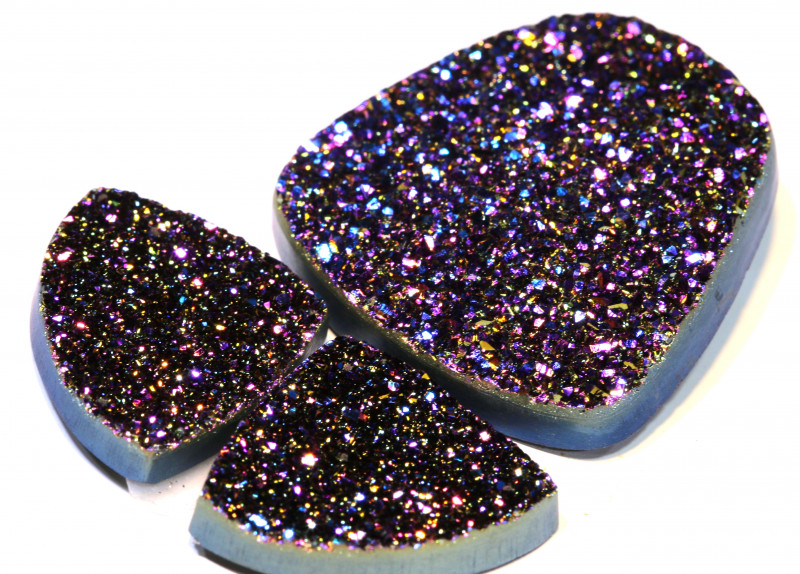 Image: Druzy with titanium coating treatment
Image: Druzy with titanium coating treatment
Druzy Gemstone Properties
Druzy quartz’s value comes from some standard properties like color, cut, and carat weight. But druzy quality also takes into account the size, evenness, and coverage (or distribution) of the crystals.
Color
Natural druzy quartz colors occur during the stone’s formation, from inclusions of certain elements (like iron for citrine), natural transformative processes (like natural irradiation in amethyst), or a combination of these.
Many quartz druzy crystals are transparent on a bluish-gray to gray agate surface, creating a muted blue to gray appearance. Other common colors are caramel and earth tones, often in light shades.
Outside of naturally iridescent rainbow pyrite, iridescence is the result of lab treatments. Certain colors like black are also created from treatments.
While non-quartz druzy gems may have brighter colors (like pink cobaltoan calcite druzy), quartz or chalcedony druzy tends to be more durable.
Cut
One pro of druzy gems is they don’t need faceted cuts to sparkle, though they’re often in similar jewelry to faceted gems. Round or oval shapes lend well to rings, while pear-shaped druzy is more popular for earrings.
Druzy cabochons are usually small because geodes have lumpy crystal clusters, though jewelers sometimes make bigger cabochons by incorporating the agate geode border.
Other common cuts are druzy beads and mesmerizing druzy carvings.
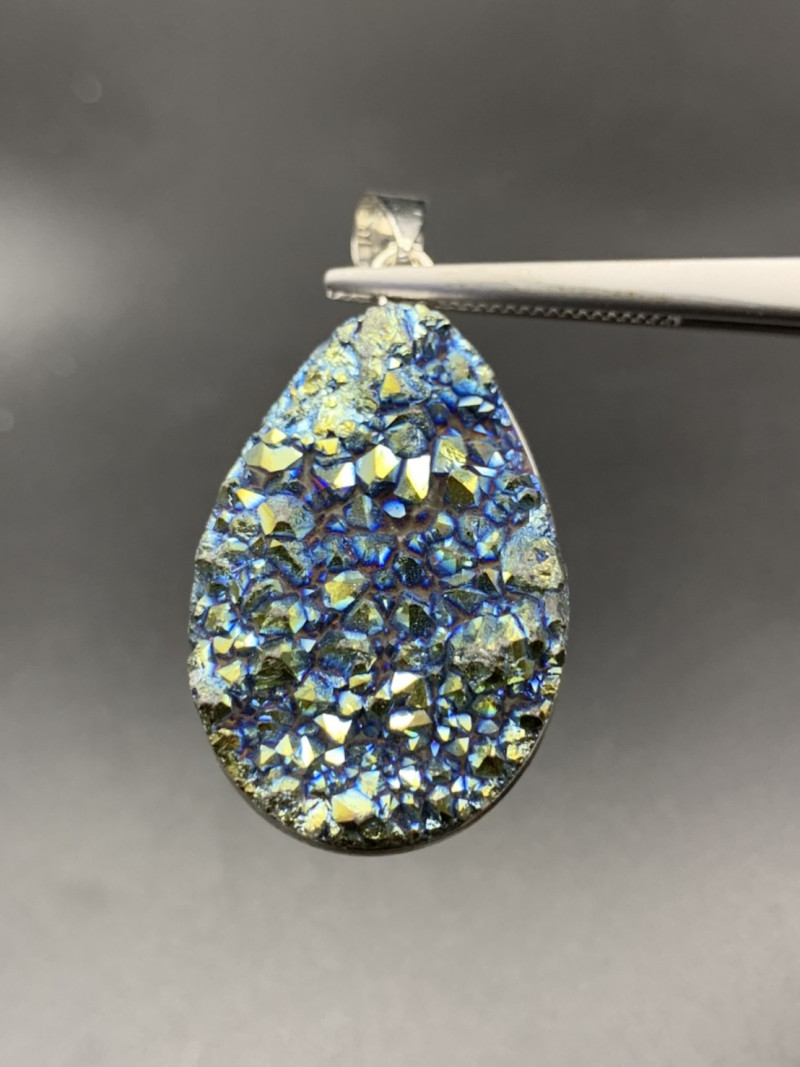
Crystal Size & Distribution
Two unique grading factors for druzy are how even the crystals are in size and how much of the stone’s surface they cover. Some jewelers split them into AA and AAA grades.
Size-wise, AA-grade druzy has crystals at varying heights, with some big crystals mixed into the tiny ones. Overall, the crystals are uneven and appear bumpy. AAA-grade druzy has only small, evenly sized crystals across.
In terms of distribution, AA druzy crystals don’t cover the stone evenly, while AAA druzy crystals fully cover the stone, sparkling all around the surface.
Sparkle
Another somewhat unique value factor for druzy is sparkle or shine, which you’ll see in natural lighting. Low-quality stones will look dull, but high-quality stones will have brilliant sparkle. This factor is straightforward but crucial nonetheless.
Treatments
Lab treatments are very common for druzy. Color-enhancing treatments include dyeing, often done alongside metallic coating.
The two common coating methods are Chemical Vapor Deposition (CVD) and electroplating. CVD involves applying a thin layer of metallic vapor (like titanium) to form a film, creating metallic iridescence and often bringing in new colors.
Electroplating is similar to CVD, but creates a thicker coat. This process involves attaching a thin metal coating via electric current to make the druzy brighter and shinier.

Druzy Formation & Sources
Natural druzy forms over thousands of years. First, silica-rich water (possibly containing other minerals or elements) quickly gets into the porous parts of geodes, thundereggs, or rock cavities.
The water breaks down some of the minerals that are present, but quickly evaporates, leaving behind the silica. Cooling is rapid, so lots of tiny crystals form instead of larger ones.
Rockhounds typically find druzy stones along shores or riverbeds, where water is nearby.
Mining Locations
Druzy quartz deposits exist worldwide, but the most abundant sources are:
Brazil
China
India
Thailand
USA
In the USA, Wyoming produces a jasper or agate covered in quartz druzy, dubbed Youngite.
Of course, price matters as well! So, what is druzy quartz worth?

Druzy Quartz Price & Value
Druzy quartz is widely available and thus, super affordable! The highest-quality druzy stones are still only $200, much lower than other gemstone’s highest-quality options.
Looking for geodes? The average overall geode price is $0.35-$2 per carat.
Below, we’ll break down the druzy quartz wholesale price ranges:
Druzy Quartz Beads: $0.20-$0.50 per carat
Druzy Quartz Cabochons: $0.15-$3 per carat
Druzy Quartz Carvings: $0.30-$4 per carat
Druzy Quartz Specimens: $0.15-$1.30 per carat
The average wholesale prices for druzy quartz jewelry are:
Lastly, let’s discuss druzy gemstone care.
Druzy Care and Maintenance
Quartz druzy is fairly durable, but hard knocks can make the tiny crystals break out. Pendants, earrings, and brooches are easier to avoid damaging than rings or bracelets. Opt for tall protective settings with bracelets or rings for greater safety.
Can druzy quartz get wet? Sometimes. Water with chemicals or minerals (e.g. pools, showers, ocean) can hurt the stone.
Follow these steps for cleaning druzy:
Mix dish soap and distilled water in a glass bowl.
Let your druzy soak for 10 minutes.
Rinse druzy with distilled water.
Gently pat it dry with a soft cloth.
Letting druzy air-dry allows droplets to create spots, so use a hair dryer (on low and cool settings) to get any moisture left. Don’t use jewelry cleaning solutions on druzy.

Dreaming of Shimmering Druzy?
Not all gemstones visually reflect the astounding process of crystal formation, but quartz druzy sure does. Whether you want to harness the stone’s empowering benefits, throwback to the ‘90s, or sparkle like fresh snow, quartz druzy gems can do it all!
Not all that into jewelry? Druzy geodes or slabs also make beautiful and inspiring decor!
Search the Gemstone Encyclopedia
Related Auctions
Related Articles
Originally the Birthstones or gemstones were associated with a zodiac sign or the month of a individuals birth. Find out what your stone is and view the stones we have for sale
8th Feb 2021
Azotic treatment of Topaz and Quartz is a treatment that creates a layer of color over a gemstone. Learn more about this treatment and check out our stones fro sale.
8th May 2018
There are dozens of quartz and chalcedony gems with various colors and patterns. Learn all about quartz properties and every type of quartz, from amethyst and agate to plasma and phantom quartz!
15th Oct 2020
Latest Articles
Shortite is a rare mineral and rarer gemstone, usually found as colorless or yellow wedge-shaped crystals. Learn the value, history, and properties of shortite in this guide!
9th Dec 2024
Senarmontite is an uncommon antimony mineral mostly used industrially but occasionally collected as rare gems or pearly crystals. Find out all of the traits, uses, prices, and history of senarmontite.
27th Nov 2024
Tantalite is a group of red, brown, or black minerals containing the rare and valuable element tantalum. Discover the uses, history, prices, and properties of tantalite gemstones in this guide!
11th Nov 2024
Article Categories
How To's is where you will find helpful articles from gem Rock Auctions on how to cut gemstones, select gemstones and buy gemstones.
9 Articles





